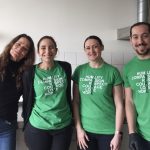Arriving at the door of the bottom floor apartment where Younis lives I can already hear the excited voices of the guys hard at work in the living room. The white paint smudges on his face and clothes make clear what’s going on here. “I’m also from Serve The City,” I say and am immediately welcomed inside. The volunteer stretches out his forearm in greeting rather than giving me a hand which is covered in paint as we introduce ourselves.
Behind him is Younis (37) who greets me in the same way as he’s also been busy painting. As we walk together to the kitchen I see how hard it is for him to move. I’d already been informed that Younis suffers from terrible back pain, which is why he can no longer work. ‘Stop with painting for a while,” I say, “so we can do this interview.”
As he washes his hands Younis tells me how grateful he is to have people around him again. It’s now a year since he fell over backwards while carrying a large pan of soup. He instantly felt a sharp pain in his back but expected it to go away eventually. It didn’t. And since then it has spread from his upper body to his feet. It’s not clear what’s wrong and Younis will be back in hospital for checks next week.
Because he can only stand for short periods and hardly walk, Younis is forced to spend most of his time at home. He’s become really lonely and is convinced that people are not meant to live in isolation like this. In fact he finds it so difficult that he feels he’s going crazy at times. Occasionally he does volunteer work in the kitchen at the De Regenboog (a charity tackling social poverty in Amsterdam), sitting down to peel vegetables. It’s not easy as he can barely stand but at least it gets him out of the house. As we chat we can hear the five Serve the City volunteers talking and laughing as they work. “This is the most fun I’ve had in some time,” says Younis.
He’s been living in his own home now for a couple of years but it wasn’t always so. Younis was homeless for a long period both in the Netherlands and in South Sudan, from where he fled the brutal war 13 years ago. Initially granted a three-year residency permit, he was then told he could no longer stay in the Netherlands. Nor could Younis go back to Sudan as he did not have a passport. So he simply stayed until he was picked up by the immigration authorities and placed in prison due to the shortage of reception facilities. He was freed after a year and told to leave the country within 48 hours. That proved impossible and after another period on the streets he found himself locked up by the authorities again.
Younis spent five years in prison, detained in an area reserved for people in the same situation: no right of residency in the Netherlands but nowhere else to go either. After carefully following the rules all that time Younis had had enough and, in 2013, decided to organise a demonstration. Along with hundreds of others, he managed to attract the attention of politicians and the media. The campaign was successful and Younis and his peers were all released and given places where they could temporarily stay. Eventually a group found a building where they could live for two years to stop it being squatted.
After being told they could no longer stay in the building, large buses arrived to pick everyone up. Very few knew where they were going to go next but Younis had found an old church that had been sold but not yet developed for use. He had to keep this a secret as nothing had been officially arranged with the owner. The people boarded the buses worried about what was coming next, only to arrive six minutes later at their new destination. They were all delighted of course and many hugged Younis and could not thank him enough. It’s a time that Younis now remembers with an air of melancholy.
Not long after being forced to leave the church building too, Younis and most of those with whom he’d been living finally received a permanent residency permit and a home of their own. But during the period of uncertainty Younis had built up considerable debt, mainly due to the very expensive rent he’d to pay during the time that he lost his right of residency. The sky-high interest charged on these debts has taken them to an unmanageable level.
The combination of poor health and massive debts has made life very tough for Younis. Fortunately he is now being helped by Civic, an organisation that has set up a restructuring arrangement that should see him free of his debts within three years. And if the hospital visit sheds some light on what is wrong with his back then better times may be around the corner. And then? Younis knows what he wants – to train to be a bus or taxi driver. He also dreams of having a small family one day…
One of the painters comes into the kitchen. Time’s up and their work is complete. Younis goes back into the living room, which is now looking great in white. He’s delighted with the result and all the help he’s received. Younis fetches some snacks out of the fridge that he has bought especially for the volunteers. I take my leave and wish Younis all the very best with his health and getting rid of those debts. Younis the bus driver with a small family… Surely that must be possible.




